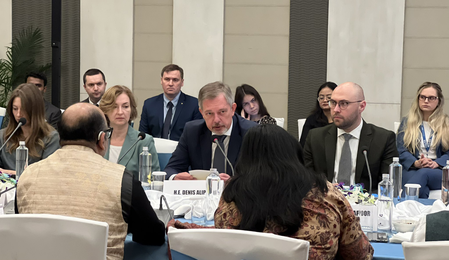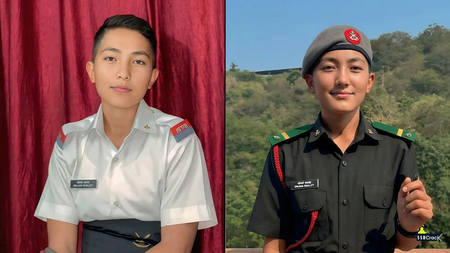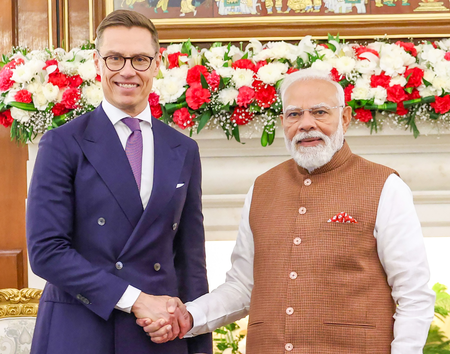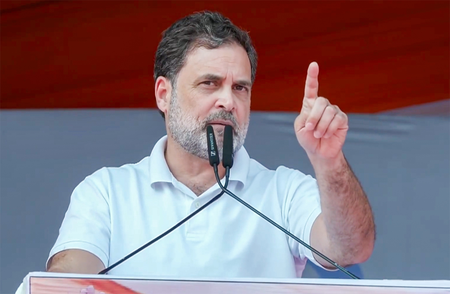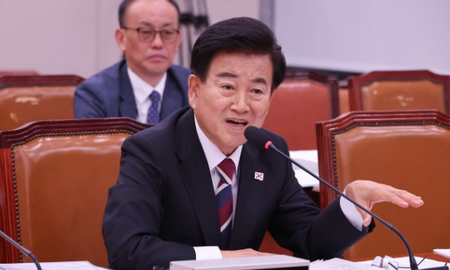
Seoul, July 14 (IANS) Unification Minister nominee Chung Dong-young on Monday said he does not agree with the view that North Korea is South Korea’s “main enemy,” instead calling the North a “threat.
Chung made the remarks during a parliamentary confirmation hearing as the former conservative Yoon Suk Yeol administration defined the North Korean regime and military as the South’s “enemy” in the 2022 defence white paper.
“I don’t agree,” Chung said when asked by an opposition lawmaker if he concurs with the view that North Korea is the South’s main enemy. “(The North) is a threat.”
South Korea defined North Korea as its main enemy for the first time in the 1995 defence white paper. In the 2004 version, the expression was replaced by a “direct military threat” amid a conciliatory mood between the two Koreas.
The former Yoon government referred to North Korea as an “enemy” for the first time in six years in the 2022 defence white paper, after the liberal Moon Jae-in administration dropped the labelling in the 2018 and 2020 editions.
In late 2023, North Korean leader Kim Jong-un defined inter-Korean relations as those between “two states hostile to each other,” vowing not to seek reconciliation and unification with South Korea. He also called the South his country’s “primary foe.”
On a now-suspended inter-Korean military tension reduction pact, Chung said he thinks the government will be able to approve its restoration in a Cabinet meeting, reported Yonhap news agency.
In June last year, the former Yoon government fully suspended the 2018 military agreement signed under the Moon administration in response to the North’s repeated trash balloon campaigns and attempts to disrupt GPS signals near border islands.
The military pact calls for halting all hostile acts against each other and setting up land and maritime buffer zones where artillery firing and drills are suspended.
Chung said before approving the restoration of the deal, he believes South Korea could take “interim” steps by refraining from military measures at sea and on land that are banned under the agreement.
Meanwhile, Chung raised the need to consider changing the name of the unification ministry, suggesting the Ministry of the Korean Peninsula could be one of the choices for the new name.
A controversy has recently emerged over whether South Korea should change the name of the Ministry of Unification in charge of inter-Korean affairs by dropping the unification reference after the North’s leader vowed not to seek unification with the South.
“This would be a very important issue that needs to be discussed with the National Assembly,” Chung said.
Some liberal experts insist the name change would help dispel North Korea’s doubts about South Korea’s possible pursuit of absorption-based unification and set the stage for resuming inter-Korean dialogue.
But conservatives and even some former liberal unification ministers are opposed to the name change, saying it could be misunderstood as South Korea not seeking unification. The Constitution stipulates South Korea will seek national unification in a peaceful manner.
On North Korea’s stance of “two hostile states,” Chung said he thinks it was the North’s response to the former South Korean government’s hard-line stance against Pyongyang.
Calling the way that East and West Germany unified a “pragmatic” approach, the nominee assessed that they pursued unification through exchanges and cooperation while effectively recognising them as two separate states.
“What the Lee Jae Myung government needs to pursue is pragmatism,” he said.
Chung said former liberal President Moon Jae-in’s proposal in 2017 to suspend a joint military exercise with the United States helped resume inter-Korean dialogue on the occasion of the 2018 PyeongChang Winter Olympics.
“This is an issue that needs to be discussed at meetings of the National Security Council,” Chung said.
Chung, a journalist-turned-lawmaker, was nominated last month as the first unification minister under the Lee Jae Myung administration. He previously served as unification minister in 2004-05 under former liberal President Roh Moo-hyun.
–IANS
int/bpd/sd/

